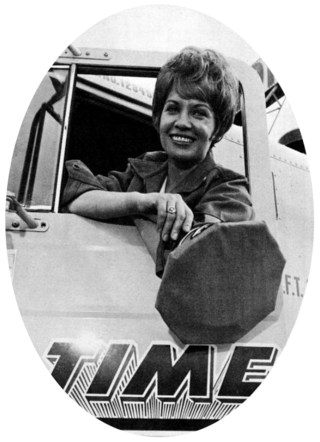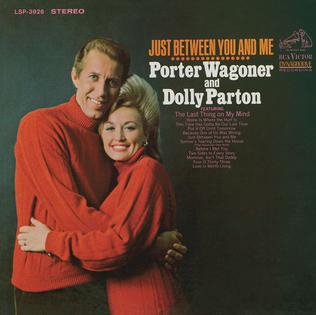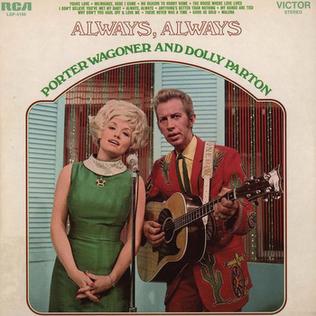Related Research Articles

Dolly Rebecca Parton is an American singer-songwriter, actress, and philanthropist, known primarily for her decades-long career in country music. After achieving success as a songwriter for others, Parton made her album debut in 1967 with Hello, I'm Dolly, which led to success during the remainder of the 1960s, before her sales and chart peak arrived during the 1970s and continued into the 1980s. Some of Parton's albums in the 1990s did not sell as well, but she achieved commercial success again in the new millennium and has released albums on various independent labels since 2000, including her own label, Dolly Records.

Porter Wayne Wagoner was an American country music singer known for his flashy Nudie and Manuel suits and blond pompadour.

Norma Jean Beasler is an American country music singer who was a member of The Porter Wagoner Show from 1961–1967. She had 13 country singles in Billboard's Country Top 40 between 1963 and 1968, recorded twenty albums for RCA Victor between 1964 and 1973, received two Grammy nominations, and was a Grand Ole Opry member for several years.

"I Will Always Love You" is a song written and originally recorded in 1973 by American singer-songwriter Dolly Parton. Written as a farewell to her business partner and mentor Porter Wagoner, expressing Parton's decision to pursue a solo career, the country single was released in 1974. The song was a commercial success for Parton, twice reaching the top spot of the US Billboard Hot Country Songs chart: first in June 1974, then again in October 1982, with a re-recording for The Best Little Whorehouse in Texas soundtrack.

Coat of Many Colors is the eighth solo studio album by American singer-songwriter Dolly Parton. It was released on October 4, 1971, by RCA Victor. The album was nominated for Album of the Year at the 1972 CMA Awards. It also appeared on Time magazine's list of the 100 Greatest Albums of All Time and at No. 257 on Rolling Stone's 2020 list of the 500 Greatest Albums of All Time. Parton has cited the title track on numerous occasions as her personal favorite of all the songs she has written.

All I Can Do is the seventeenth solo studio album by American singer-songwriter Dolly Parton. It was released on August 16, 1976, by RCA Victor. The album was co-produced by Parton and Porter Wagoner and would be the last of Parton's solo albums to have any involvement from Wagoner. It was nominated for Best Country Vocal Performance, Female at the 19th Annual Grammy Awards. The album spawned three singles: "Hey, Lucky Lady", "All I Can Do", and "Shattered Image".

Porter & Dolly is the thirteenth and final collaborative studio album by Porter Wagoner and Dolly Parton. It was released on August 4, 1980, by RCA Victor. The album is made up of previously unreleased material recorded during Wagoner and Parton's duet years (1967–76), with new studio overdubs. It was released as part of a settlement from legal action Wagoner took against Parton following her departure from his band and syndicated television series. Two singles were released from the album. "Making Plans" peaked at number two on the Billboard Hot Country Singles chart and "If You Go, I'll Follow You" peaked at number 12.

Bubbling Over is the twelfth solo studio album by American singer-songwriter Dolly Parton. It was released on September 10, 1973, by RCA Victor. The album cover photo was shot by Nashville photographer Les Leverett near the fountain at the Country Music Hall of Fame.

The Best of Dolly Parton is a compilation album by American singer-songwriter Dolly Parton. It was released on November 9, 1970, by RCA Victor. The album was produced by Bob Ferguson. It includes some of Parton's early hits, a few non-single album tracks, and two previously unreleased tracks. The album peaked at number 12 on the Billboard Top Country Albums chart. The single, "Mule Skinner Blues " peaked at number three on the Billboard Hot Country Songs chart and earned Parton a nomination for Best Female Country Vocal Performance at the 13th Annual Grammy Awards. The album was certified Gold by the RIAA on June 12, 1978, for sales of 500,000 copies.

Just Between You and Me is the first collaborative studio album by Porter Wagoner and Dolly Parton. It was released on January 15, 1968, by RCA Victor. The album was produced by Bob Ferguson. It peaked at number eight on the Billboard Top Country Albums chart and spawned one single, "The Last Thing on My Mind", which peaked at number seven on the Billboard Hot Country Songs chart.

Just Because I'm a Woman is the second solo studio album by American singer-songwriter Dolly Parton. It was released on April 15, 1968, by RCA Victor. The album was produced by Bob Ferguson. It peaked at number 22 on the Billboard Top Country Albums chart. The album's title track was the only single released and it peaked at number 17 on the Billboard Hot Country Singles chart.

Always, Always is the third collaborative studio album by Porter Wagoner and Dolly Parton. It was released on June 30, 1969, by RCA Victor. The album was produced by Bob Ferguson. It peaked at number five on the Billboard Top Country Albums chart and number 162 on the Billboard 200 chart. "Yours Love" and the album's title track were released as singles, peaking at numbers nine and 16, respectively.

A Real Live Dolly is the first live album by American singer-songwriter Dolly Parton. It was released on June 29, 1970, by RCA Victor. The album was produced by Bob Ferguson and was recorded on April 15, 1970, at Sevier County High School in Sevierville, Tennessee. It peaked at number 32 on the Billboard Top Country Albums chart and number 154 on the Billboard 200 chart.

Porter Wayne and Dolly Rebecca is the fourth collaborative studio album by Porter Wagoner and Dolly Parton. It was released on March 9, 1970, by RCA Victor. The album was produced by Bob Ferguson. It peaked at number four on the Billboard Top Country Albums chart and number 137 on the Billboard 200 chart. Two top ten singles were released from the album, "Just Someone I Used to Know" and "Tomorrow Is Forever", peaking at numbers five and nine, respectively. "Just Someone I Used to Know" was nominated for Best Country Performance by a Duo or Group at the 12th Annual Grammy Awards.

Once More is the fifth collaborative studio album by Porter Wagoner and Dolly Parton. It was released on August 3, 1970, by RCA Victor. The album was produced by Bob Ferguson. It peaked at number 7 on the Billboard Top Country Albums chart and number 191 on the Billboard 200 chart. The album's single, "Daddy Was an Old Time Preacher Man", peaked at number 7 on the Billboard Hot Country Songs chart and was nominated for Best Country Performance by a Duo or Group at the 13th Annual Grammy Awards.

The Best of Porter Wagoner & Dolly Parton is a compilation album by Porter Wagoner and Dolly Parton. It was released on July 19, 1971, by RCA Victor. The album contains tracks from each of their collaboration albums released up to that point, with the exception of 1969's Always, Always. The album included one previously unreleased track, the Grammy-nominated single, "Better Move It on Home".

The Right Combination • Burning the Midnight Oil is the seventh collaborative studio album by Porter Wagoner and Dolly Parton. It was released on January 3, 1972, by RCA Victor.

The singles discography of American country singer-songwriter Dolly Parton includes over 200 singles and touches on eight decades. Parton has released 198 singles as a lead artist, 49 as a featured artist, six promotional single and 68 music videos. Parton also released 21 singles with Porter Wagoner from 1968 to 1980, bringing her total number of singles to 243.
"Put It Off Until Tomorrow" is a song written by Dolly Parton and Bill Owens, and first recorded by American country music artist Bill Phillips. It was released in January 1966, and Phillips released an album of the same name later that year. The song became his biggest hit, peaking at number 6 on the Billboard Hot Country Singles chart. Parton provided uncredited harmony vocals on the single. The song has been covered by numerous artists, and became a top ten hit for The Kendalls in 1980.
References
- ↑ Kosser, Michael (2006). How Nashville Became Music City, U.S.A.: A History Of Music Row. Lanham, Maryland, US: Backbeat Books. p. 115. ISBN 978-1-49306-512-7.
- ↑ "Inductees: Jack Clement". Nashville Songwriters Hall of Fame. 1973. Retrieved July 31, 2024.
- ↑ "Porter Wagoner". GRAMMY.com. 15 February 2019. Retrieved 24 May 2019.
- ↑ "Dolly Parton". GRAMMY.com. 15 February 2019. Retrieved 24 May 2019.